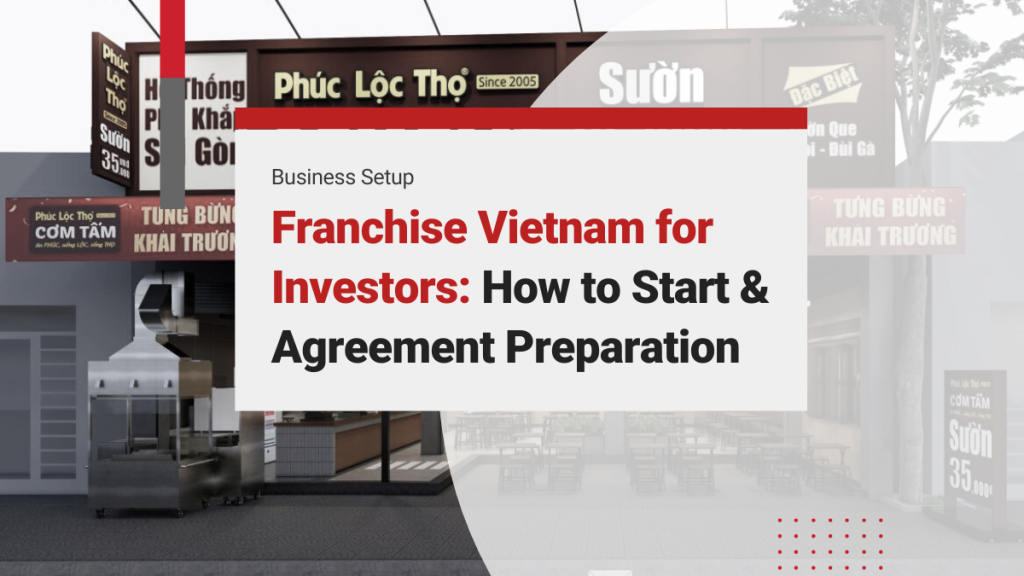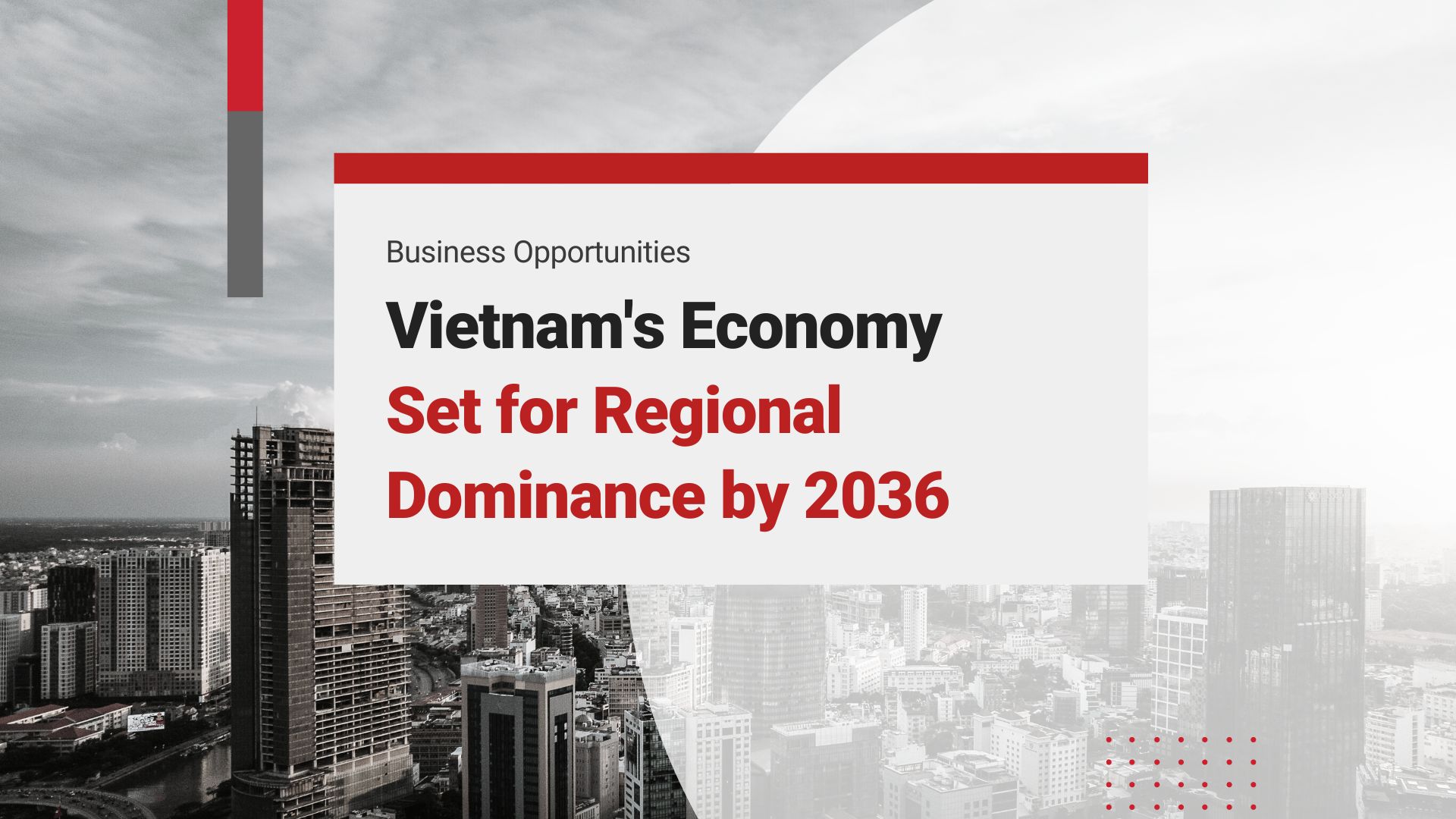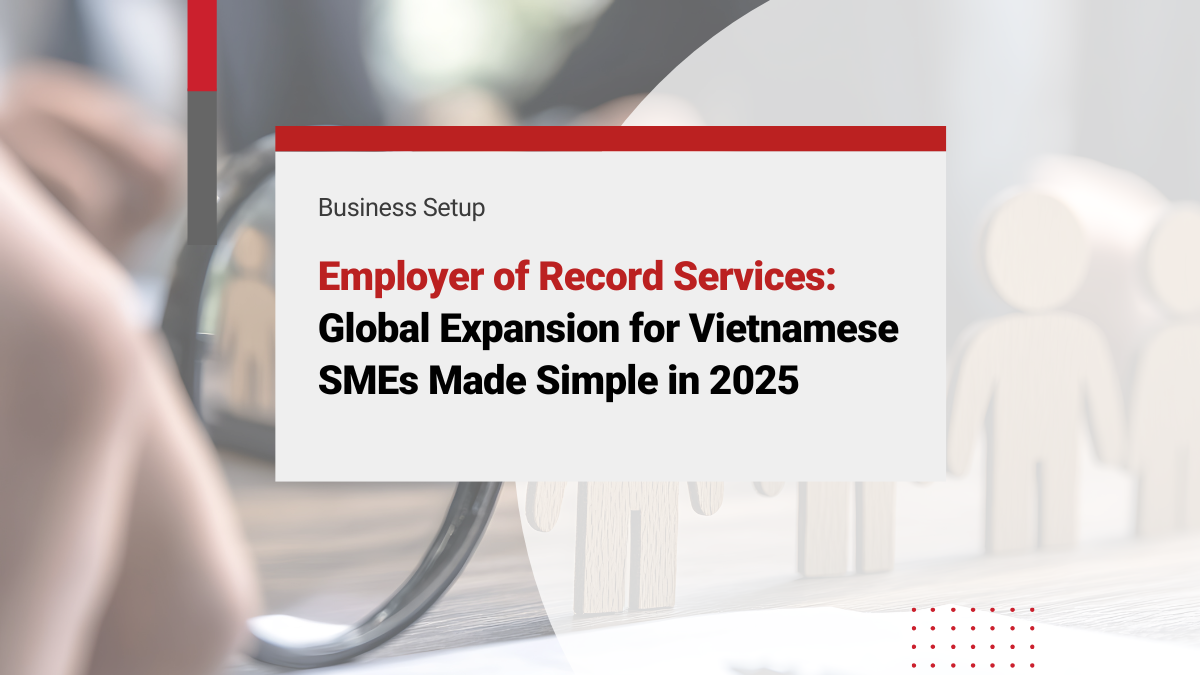Franchising has long been a popular business model, and Vietnam’s fast-growing market presents significant opportunities for foreign brands through franchise Vietnam. Franchising allows international companies to expand and tap into the country’s favorable business climate. However, setting up a franchise in Vietnam requires strict adherence to government regulations.
Foreign brands are increasingly drawn to Vietnam, while local investors eagerly seek established global names like Pizza Hut, McDonald’s, KFC, Burger King, Baskin Robbins, and Lotteria to attract customers, fueling the growth of the franchise sector in the country.
With a population of 100 million, 70% under the age of 40, franchise Vietnam offers a young, consumer-driven market ideal for franchise growth. The rising middle class and impressive GDP growth, reaching 8% in 2022, further fuel opportunities for both local and international franchises looking to enter the Vietnamese market.
Interested in Franchise Vietnam? Check out InCorp Vietnam’s Services, and our Experts will Assist you!
In this article, we delve into the essential elements of franchise Vietnam, covering everything from legal requirements to the process of establishing a franchise. It serves as a comprehensive guide for investors seeking to enter this rapidly growing market, helping them navigate regulations and understand the opportunities within Vietnam’s thriving franchise sector.
Definitions of Franchise Vietnam
What is a Franchise Business?
A franchise business is a specific kind of business model when two parties draw up an agreement to start an enterprise under the brand name of one particular company. The essential part of such business agreements is that the franchisor (the company whose name would be used) permits the franchisee (the one who is starting the business) to take advantage of its goodwill and reputation. Meanwhile, the local business, which has started using the brand name, is helping the foreign company to expand its business into a new market.
The franchisee must pay fees to operate under the franchisor’s brand, including costs for using logos, products, and other brand-specific elements. The products offered in the Vietnamese franchise market will mirror those sold globally. As part of the agreement, the franchisee must share a percentage of profits with the franchisor.
In exchange, the franchisee gains the right to open new business locations and sell the franchisor’s products or services, following its established processes. Royalties are typically a fixed percentage of the franchisee’s earned profits.
Franchise Opportunities in Vietnam
When it comes to setting up a business, franchise Vietnam is often a more viable option than starting from scratch. It requires no prior industry experience, and market research is already done as the target audience is established. Plus, franchisors provide crucial support, reducing risks and enhancing the chances of success.
Foreign investors seeking franchise Vietnam opportunities can attract local businesses by promoting the potential for quick returns. A proven business model allows franchises to generate profits early, unlike startups.
Moreover, collective buying power reduces operational costs, while franchisors offer training and site selection support. These factors, combined with an established customer base, lead to lower failure rates for franchises in Vietnam.
Additionally, franchising has benefits like
- An established name and recognition
- Use of set design or decor
- Established protocols and standards
- Opportunity to leverage tried and tested products
- Tested techniques and strategies for running the business
- Leveraging the ongoing promotion campaigns
However, certain areas of concern in franchise Vietnam should be addressed before signing franchising contracts. Franchising can increase starting costs due to royalties and fees for using the brand name. Additionally, the limited control over product choices and suppliers can hinder business flexibility. The local enterprise may have little say in making key business decisions, as most decisions are controlled by the brand. Understanding these limitations is essential for ensuring a successful franchise venture in Vietnam.
Overview of the Franchise Vietnam Market
The concept of franchise Vietnam began in the 1990s when consumers sought access to global products, leading to the arrival of foreign brands like Starbucks, McDonald’s, and KFC. These brands were initially unfamiliar in Vietnam, but over time, they gained significant popularity. By 2024, they had become household names, solidifying the growth and success of franchising in the country. The increasing demand for international products has been a key driver of franchise expansion in Vietnam, offering both local and foreign businesses growth opportunities.
The ever-increasing population of 100 million people who have a diverse taste and are dynamic in nature has made this country a popular choice for franchise businesses. As of 2022, 65% of the Vietnamese population was under 35 years old, with many aspiring to become global citizens by purchasing international products as they entered the workforce. This increasing consumer demand has driven significant growth in the franchise Vietnam market, as younger generations seek access to global brands and experiences. This demographic shift, combined with rising disposable income, has created a fertile environment for franchises to flourish in Vietnam, offering substantial opportunities for both local and foreign investors.
Read More: Vietnam’s Workforce: High Demand Skills and Advice for Business in 2024
The franchising landscape has been further strengthened by the several Free Trade Agreements (FTA) Vietnam has with other countries as it lowered trade tariffs, making it easier to import goods necessary for franchise businesses to flourish.
While the franchising industry started with the food sector, it has captured the retail market as well. This is because of the rise of franchise commerce through online platforms coupled with foreign investments in retail. At present, Vietnam is home to several retail companies like Thegioididong, Circle K, etc.
In 2024, Vietnam attracted luxury brands like Singaporean watch retailer Hour Glass and Italian footwear René Caovialla. Fast fashion chains like Uniqlo, H&M, and Muji also expanded their footprint in the country this year. With e-commerce fast gaining momentum, Vietnamese shoppers are likely to opt for more foreign products, attracting more brands to establish franchises in the country.
As per Deloitte and AT Kearny’s sustainable retail reports, Vietnam will be the second fastest-growing e-commerce market by 2025. It was in sixth place when the brands came up with their report in 2022.
The general consumer potential in Vietnam is growing exponentially in this decade as the income pyramid accelerates. The number of Vietnamese consumers will grow by 36 million in this decade. With 20% of the population spending over US$30 per day by 2030 and most customers able to spend more than US$11 per day in 2022, Vietnam is the ideal ground for franchising.
Read Related: The Definitive Guide to Vietnam’s 16 Active Free Trade Agreements – FTAs
Who Can Open a Franchise in Vietnam?
As of 2022, the franchise in Vietnam is the fastest-growing segment, with foreign brands coming in every year. This is because of events like the Vietnam International Retailtech & Franchise Show (VIETRF), organized by Vinexad, Retail & Franchise Asia, and Coex Vietnam.
Furthermore, the rise in online platforms for the franchising industry, like FranchiseAsia.com, has opened up floodgates for more brands to attract Vietnamese customers. As per Vietnamese law, franchise businesses can be 100% foreign-owned companies, which often act as a stimulant for brands who want to expand to new markets. This is quite visible in the steady growth of franchises in the country, from 213 in 2021 to 310 in 2023. Of these, 50% are from the F&B sector.
A franchise in Vietnam can be opened in either of the following ways:
- By obtaining a franchise business from a foreign franchisor as a Vietnamese franchisee.
- By obtaining a franchise business from a Vietnamese franchisor as a foreign franchisee
Additionally, the franchisor and the franchisee have to sign a franchise agreement and register the establishment with the Vietnamese government offices. In case of not registering and signing the agreement, both parties are fined.
Read Related: Top Food and Beverage Companies in Vietnam: Startups Transforming the FMCG F&B Industry
How to Start a Franchise Business in Vietnam?
To start a franchise business in Vietnam, you need to follow the requirements given below as per Decree No. 8/2018/ND-CP:
- Your franchise system should be operational for at least a year.
- You can’t open a sub-franchise until the master franchise is operational for a year.
- You can only offer products and services listed under the prohibited products and services list of the Vietnamese government. The list includes organized gambling, weapons, adoption broker services, marriage broker services, toxic minerals, environment-polluting imported scraps, addictive drugs, plants, wild animals, and harmful and dangerous toys for children.
- You need special business licenses to offer certain products and services.
- The brand must be registered in Vietnam, and for this, the franchisor has to submit documents like franchise agreements, disclosure documents, etc. to the Vietnamese Ministry of Industry and Trade. However, in certain cases, commercial franchising registration isn’t required.
- The brand should also inform the Trade Ministry about any changes in the franchisees and submit an annual report.
Additionally, both the franchisee and the franchisor should ensure that the following details are underlined in the franchise agreements to fulfill all franchise commerce requirements as per Vietnamese law.
- Expenses like royalties, training, marketing, etc., and franchising fees.
- Product supplies
- Intellectual property rights and trademarks
- Advertising provisions
- Location and site selection
- Operational guidelines and building requirements
- Renovations and maintenance provisions
- Training and support costs
- Bookkeeping and records
- The duration of franchising
- Compliance-related clauses
- Terminal and renewal details
- Plan of action to settle disputes
Foreign investors looking to start a franchise in Vietnam should go for it after a thorough assessment of their franchising potential in the country, like market demand for the services and products they offer. Moreover, brands need to take into account other factors like setting a proper franchise model and preparing all the franchising documents in consultation with a legal expert.
Read More: Everything You Need To Know about Company Incorporation in Vietnam
Franchise Vietnam Registration: Legal Requirements and Procedure
Legal Requirements and Procedure
The following documents need to be submitted to register as a franchise in Vietnam:
- Power of attorney
- Franchise agreement
- Permission document from the brand or the primary franchisor
- An introduction of the brand or franchisor
- Copyright certificate or trademark
- The brand’s or the franchisor’s business certificate
- Previous years’ audit reports
- Franchise registration form
The following specific details should be included in each type of franchise document submitted for registration.
- The introduction document must have the trade name, office address, and contact details of the franchisor along with the business establishment date and franchise business type and field.
- The intellectual property and trademark document should specify the right to use the trademark and other details.
- Further information about the brand, like details of the board of directors and the division in charge of the franchise, along with the experience of the franchisor in the field and recent lawsuits against the company, is needed. The brand should also mention the organizational structure while supplying information about it.
- The franchisee’s initial fee details should include the exact time of payment, the rates and types of the fees, and cases of reimbursement or refund of the fees. Other financial obligations that the franchisee needs to fulfill, like advertising fees, service fees, rental fees, training fees, periodic fees, etc., must be mentioned in the agreement as well.
- The contract should also demarcate the initial investment the local partner should be making, like equipment, decoration and security expenses, business place, purchase of goods, and other pre-paid fees.
- Additionally, the obligations of the franchisee to inform or take permission before buying or hiring items, modifying franchise regulations, etc. should be included in the agreement. Similarly, the brand’s obligations, especially those during the signing stage, operating phase, choosing the location, and training for the business, must be highlighted.
- The franchise agreement form should include conditions for termination for both the brand and the franchisee, conditions for contract extension, and obligations of both parties in case of termination. It must also have details of assigning the franchise to another entity if the franchisee dies or the franchisor/franchisee is declared ineligible.
- The contract should also include details related to the franchising system, like the number of franchises operational in the past and present, the number of franchise agreements signed, and the number of transfers made to third parties.
Goods and Services Prohibited of Franchise Vietnam
As per the Vietnamese franchise law, certain services and products are banned from the franchising business. Hence, you can’t do franchise commerce if your business offers the following:
- Organized gambling
- Weapons
- Adoption broker services
- Marriage broker services
- Toxic minerals
- Environment-polluting imported scraps
- Addictive drugs
- Plants
- Wild animals
- Harmful and dangerous toys for children.
Read More: A Comprehensive Guide to Regulated Business Lines in Vietnam
Conditions to be Met by Franchisors and Franchisees
A franchise is started in Vietnam upon fulfilling certain conditions by the franchisors and the franchisees.
While the brand needs to ensure that
- They have been operational for a year.
- They have written approval from the Vietnamese Trade Ministry.
The franchisees have to take care that
- The business is registered in relevant sectors in line with the original brand registration in Vietnam.
- The sub-franchises are formed after the master franchisee has completed business for a year.
The Franchise Vietnam Journey: Your Options
If you are franchising from overseas to enter the Vietnamese franchise market, you have to ensure the following (only applicable to those who don’t have an entity in the country):
- Register your franchising activities with the Ministry of Industry and Trade (MOIT).
- You have a local partner who will set up the franchise in Vietnam and formulate the subcontracts.
- The 15-day timeline to set it up
To establish an FDI company in Vietnam for franchising in the country, you need to take care of the following:
- Getting an approval letter from the People’s Committee where you are setting up the franchise
- Obtaining trade permits and sublicenses once the FDI company is established
In case you are buying a local business for franchising in Vietnam, you need to ensure the following:
- The entity has been operational for a year.
Additionally, keep in mind that F&B franchising requires sub-licenses:
- Environmental protection plan registration
- Certificate of Food Safety Condition (COFSC)
- Fire protection system registration
- Product registration certificate
- Alcohol license
Legal Overview of Commercial Franchise Vietnam Regulations
Franchise commerce in Vietnam is done as per specific Vietnamese regulations summarized below.
- Article 284 says that commercial franchising is permitted when products and services are offered as per the methods underlined by the franchisor with proper brand names, slogans, logos, and trademarks. The brands can assist and supervise the franchises’ business activities.
- Article 285 says that the franchise contracts should be written in the designated forms with legal validity.
- Article 286 upholds the rights of the franchisors to receive sums from the franchisee and to organize advertising campaigns within the commercial franchise network. They can also conduct inspections to ensure that the products and services offered by the local business are up to standard.
- Article 287 speaks of the brand’s obligation to supply franchising documents, to design and arrange the place, to equally treat all franchises, to provide technical assistance and training support to the franchises, and to guarantee intellectual property rights of objects.
- Article 288 establishes the franchisees’ rights, like the ability to request the brand for technical assistance and equal treatment.
- Article 289 demarcates the obligations of the franchisees, like paying fees and royalties to the brand, investing in facilities and human resources, and confidentiality of the brand business model after termination of the contract. Additionally, it also underlines that the local partners have to abide by the instructions of the brand and submit to supervision. The franchisees must stop using trademarks, logos, slogans, etc. of the brand once the contract terminates, and they are also prohibited from sub-franchising without permission. All activities conducted by the franchise should be done as per the brand’s franchise system.
- Article 290 provides information on third-party subfranchising conditions. This includes establishing the rights and obligations of the subfranchisees as per Articles 288 and 289, along with the need for consent from the brand.
- Article 291 provides information regarding the franchise registration procedure, like how the brands need to get approval from the Trade Ministry and obtain specific business conditions about conducting local business from the government.
Franchise Vietnam Agreement
As per Vietnamese law, foreign brands need to sign a franchise agreement with their local business partner for franchising. The agreement should specify how the brand’s trademarks, like logos, slogans, names, etc., can be used to buy and sell goods and services by the franchisee.
It covers the rights and obligations of both the franchisee and franchisor, along with details of fees, the mode of paying the fees, and the validity period of the contract. Terms and conditions of extension, transfer, or termination of the contract, ways to settle disputes, and other details are also demarcated in the agreement.
The Vietnamese franchising law hasn’t set any specific limit for the duration of the contract. However, Decree No. 35/2006/ND-CP warrants that the agreements are written in Vietnamese if franchising from abroad to Vietnam. While franchising overseas from Vietnam, English can be used to write the contracts. Brands failing to provide contracts in Vietnamese are subjected to a fine of VND 6,000,000 – 10,000,000.
Read Related: 5 Common Agreements in Vietnam: A Guide of Non-disclosure Agreement
Anytime Fitness Franchise Vietnam Journey

The challenges and problems areas of franchising in Vietnam can be understood from the case of the American brand Anytime Fitness (AF), which wasn’t aware of the complex registration and incorporation process fitness studios and gyms have to go through. InCorp Vietnam helped them acquire various sports and fitness-related permits and licenses, leading to the setting up of multiple AF franchises in the country. The brand now has 3 AF franchises in Vietnam’s largest city Ho Chi Minh alone.
Read More: Fitness Industry & Consumer Trends, Challenges and Business Opportunities
How can InCorp Vietnam Assist?
At InCorp Vietnam, our expert team of regulatory advisors and consultants has an in-depth understanding of the franchising regulations in Vietnam. We leverage our extensive experience to help businesses, particularly foreign investors, navigate the complexities of the franchising process. From legal compliance to business registration, we ensure that every step is handled efficiently, allowing you to focus on growing your franchise without unnecessary delays or obstacles.
Whether you’re a well-established global brand or a new investor looking to enter the dynamic Vietnam market, our team provides tailored solutions to meet your specific needs. We work closely with you to ensure that all regulatory requirements are met and that your entry into the Vietnam franchise market is smooth and seamless.
For a hassle-free experience and expert guidance in setting up your franchise, contact InCorp Vietnam today. Let us help you successfully tap into one of Southeast Asia’s most promising franchise markets.

clients worldwide

professional staff

incorporated entities in 10 years

compliance transactions yearly
Learn the Right Setup for Business
Expansion in the Vietnam
Frequently Asked Questions
Chuỗi franchise là gì?
- Chuỗi franchise (hay chuỗi nhượng quyền) là mô hình kinh doanh trong đó một cá nhân hoặc doanh nghiệp (bên nhận quyền) được quyền sử dụng thương hiệu, mô hình kinh doanh, sản phẩm hoặc dịch vụ của một doanh nghiệp khác (bên nhượng quyền) theo các điều kiện đã thỏa thuận. Bên nhận quyền thường phải trả phí ban đầu và phí duy trì định kỳ, đồng thời tuân thủ các quy định vận hành do bên nhượng quyền đặt ra.
How To Get Franchise
- To get a franchise, research and choose a reputable brand, meet their financial and experience requirements, and submit a franchise application. If approved, you'll sign a franchise agreement and complete any required training before launching your location.
How To Start A Franchise
- To start a franchise, research and select a reputable franchisor, review the Franchise Disclosure Document (FDD), and secure necessary financing. Then, sign the franchise agreement, complete required training, and follow the franchisor’s guidelines to launch your business.






